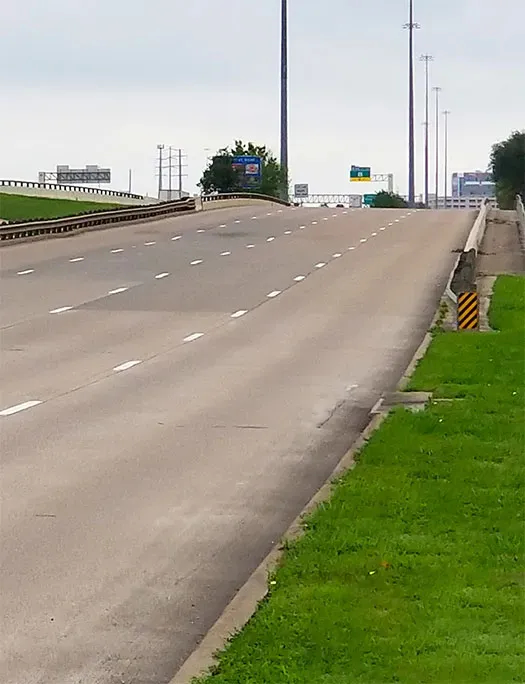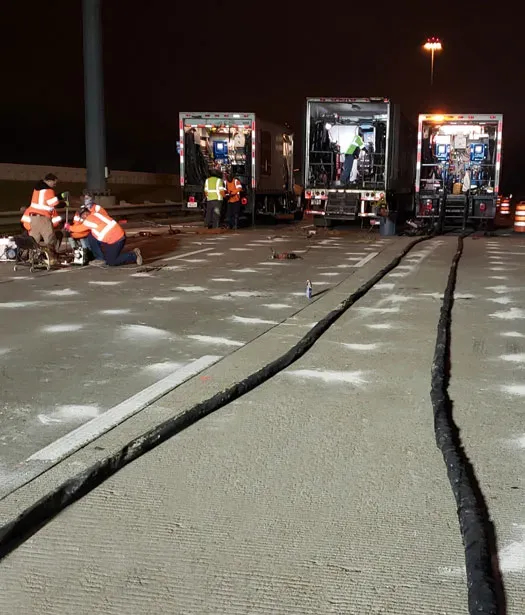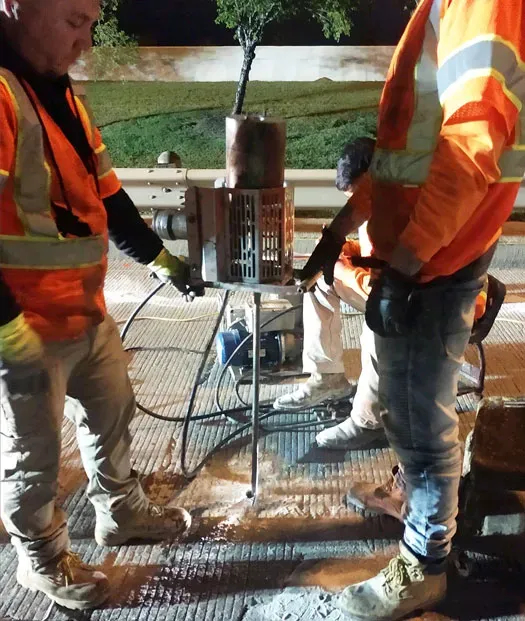Rapid I-69 Feeder Road Settlement Repair in Sugar Land, Texas
Problem
When the feeder road of I-69 north between University Blvd and Sweetwater Blvd suddenly settled across all four lanes by as much as three inches, city officials in Sugar Land, Texas suspected a recently-completed trenchless steel casing water main project had something to do with the problem. In this densely populated area, and with the new water main installed 12 feet below the surface, Sugar Land city officials were primarily concerned with the significant traffic delays associated with a traditional repair job. Hoping for a speedier solution, the city of Sugar Land called URETEK.
Analysis
URETEK arrived on the scene and learned that TXDOT needed a rapid solution, with all work completed within a 72-hour window, and with no total lane closures. The total project area was identified as a 50-foot x 50-foot section of roadway, involving all four lanes, and needing almost three inches of lift. URETEK Deep Injection® (UDI) was proposed for the site to stabilize the soils, fill voids that had opened during the earlier water main project, and lift the busy roadway back to its originally designed grade. Three Dynamic Cone Penetrometer (DCP) tests were conducted on site to test the soil strength, identify voids, and confirm the injection plan.
Solution
The City of Sugar Land started to set up traffic control on Friday night at 9:00 pm. The I-69 exit ramp to the feeder road was closed, along with the left three lanes. By 10:30 pm, URETEK crews were on site and assessing the situation. With DCP testing completed, an injection plan involving four different levels of injection was agreed upon. By 9:00 am Saturday morning, city officials were able to move the traffic back onto the left two lanes while URETEK started injections in the right two lanes.
Result
The entire project was finished by 1:00 pm Saturday afternoon, over 24 hours ahead of the deadline given by TXDOT and the City of Sugar Land. UDI removed the dip from all four lanes while stabilizing the remaining soils and filling identified voids under the slab. The busy roadway was back in service to start the work week, and TXDOT and Sugar Land officials were very happy with the job done by URETEK.
URETEK Deep Injection® (UDI)
Widely referenced throughout our industry, UDI involves the injection of structural polymer into base and subgrade soils to increase the load bearing capacity. This is achieved by injecting the polymer through small holes drilled directly through the pavement structure to depths determined by site-specific analysis. Our URETEK 486 Star® material flows easily into voids and weak zones within the soil mass below. Through a controlled chemical reaction, the expanding polymer compacts surrounding soils and applies a controlled pressure on targeted areas of the affected pavement above. If needed, a multi-injection design plan is utilized to gently return the pavement to its original grade. The composite material quickly cures into a strong, dimensionally stable, and water-resistant geo-material, providing years of reliable service.
URETEK 486 Star®
URETEK 486 Star® polymer is a two-component, high-density, expanding thermoset polyurethane system. It was developed to be the ideal solution for under-sealing, void filling, lifting of settled pavement, stabilization and stiffening of weak soils, and for encapsulating and sealing buried infrastructure. URETEK 486 Star® is environmentally inert, non-toxic, and resists underground water erosion or weakening due to its industry-leading hydrophobic properties.


